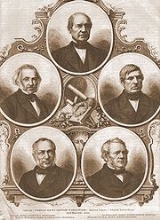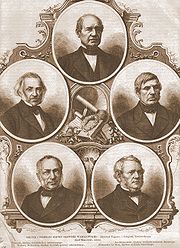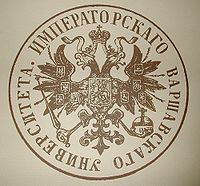
Józef Mianowski
Encyclopedia

Poles
thumb|right|180px|The state flag of [[Poland]] as used by Polish government and diplomatic authoritiesThe Polish people, or Poles , are a nation indigenous to Poland. They are united by the Polish language, which belongs to the historical Lechitic subgroup of West Slavic languages of Central Europe...
medical researcher and practitioner, academic, social and political activist, and rector
Rector
The word rector has a number of different meanings; it is widely used to refer to an academic, religious or political administrator...
of the "Main School" incarnation (1862-69) of Warsaw University
University of Warsaw
The University of Warsaw is the largest university in Poland and one of the most prestigious, ranked as best Polish university in 2010 and 2011...
.
In honor of Mianowski, after his death, in 1881, a foundation was inaugurated to support scientific and scholarly research, named Kasa imienia Józefa Mianowskiego — "the Józef Mianowski Fund" or, more simply, "the Mianowski Fund."
Life
In his youth, Mianowski graduated from Wilno University. He served as a clinical assistant to Jędrzej ŚniadeckiJedrzej Sniadecki
Jędrzej Śniadecki was a Polish writer, physician, chemist and biologist. His achievements include the creation of modern Polish terminology in the field of chemistry.-Life and work:...
, was a friend of Polish Romantic poet
Romanticism in Poland
Romanticism in Poland was a literary, artistic and intellectual period in the evolution of Polish culture that began around 1820, coinciding with the publication of Adam Mickiewicz's first poems in 1822. It ended with the suppression of the January 1863 Uprising against the Russian Empire in 1864. ...
Juliusz Słowacki, and in 1831 married (his wife died only a year later, in childbirth).
A rising star in medicine, in 1838 Mianowski became an assistant professor at the Wilno Medical-Surgical Academy (a school detached from Wilno University, which had been closed in the aftermath of the November 1830 Uprising
November Uprising
The November Uprising , Polish–Russian War 1830–31 also known as the Cadet Revolution, was an armed rebellion in the heartland of partitioned Poland against the Russian Empire. The uprising began on 29 November 1830 in Warsaw when the young Polish officers from the local Army of the Congress...
. A lecturer in animal and human physiology
Physiology
Physiology is the science of the function of living systems. This includes how organisms, organ systems, organs, cells, and bio-molecules carry out the chemical or physical functions that exist in a living system. The highest honor awarded in physiology is the Nobel Prize in Physiology or...
and general therapeutics in 1839–42, he thrice received a prestigious "diamond ring" from the Russian Tsar.
In 1840, as physician to Polish independence activist Szymon Konarski
Szymon Konarski
Szymon Konarski was a 19th-century Polish radical democratic politician and revolutionary. As a politician, he supported the radical idea of social and economic equality for all men, as well as the right of political and national liberty and self-governance.Konarski supported the idea of land...
, Mianowski was arrested and harshly interrogated, but half a year later he was declared innocent and rehabilitated. He accepted a position at the Saint Petersburg
Saint Petersburg
Saint Petersburg is a city and a federal subject of Russia located on the Neva River at the head of the Gulf of Finland on the Baltic Sea...
Medical-Surgical Academy, where he oversaw the gynecology and pediatrics
Pediatrics
Pediatrics or paediatrics is the branch of medicine that deals with the medical care of infants, children, and adolescents. A medical practitioner who specializes in this area is known as a pediatrician or paediatrician...
wards. He worked at the Academy from 1842 to 1860. In 1848 he was appointed personal physician to the Tsar's daughter, Grand Duchess Maria Nikolaievna, Duchess of Leuchtenberg. He was also chief physician at the Second Hospital of Land Forces. In 1860 he retired, but remained physician to the Grand Duchess and had extensive contacts at the Russian Imperial court.
In 1862 Mianowski became rector
Rector
The word rector has a number of different meanings; it is widely used to refer to an academic, religious or political administrator...
of the Warsaw Main School
University of Warsaw
The University of Warsaw is the largest university in Poland and one of the most prestigious, ranked as best Polish university in 2010 and 2011...
(Szkoła Główna Warszawska), then the only institution of higher learning in Russian Poland
Partitions of Poland
The Partitions of Poland or Partitions of the Polish–Lithuanian Commonwealth took place in the second half of the 18th century and ended the existence of the Polish–Lithuanian Commonwealth, resulting in the elimination of sovereign Poland for 123 years...
(all others having been closed after the November 1830 Uprising). The Main School was a reincarnation of the closed University of Warsaw
University of Warsaw
The University of Warsaw is the largest university in Poland and one of the most prestigious, ranked as best Polish university in 2010 and 2011...
. Mianowski gained popularity among students and faculty for his liberal
Liberalism
Liberalism is the belief in the importance of liberty and equal rights. Liberals espouse a wide array of views depending on their understanding of these principles, but generally, liberals support ideas such as constitutionalism, liberal democracy, free and fair elections, human rights,...
views; his inaugural speech stressed the links between Polish and western cultures.
During the January 1863 Uprising
January Uprising
The January Uprising was an uprising in the former Polish-Lithuanian Commonwealth against the Russian Empire...
, Mianowski lent clandestine support to the insurgents. In later stages of the uprising, he participated in the falsification of academic records to provide alibi
Alibi
Alibi is a 1929 American crime film directed by Roland West. The screenplay was written by West and C. Gardner Sullivan, who adapted the 1927 Broadway stage play, Nightstick, written by Elaine Sterne Carrington, J.C...
s of attendance to many students who took part in the uprising. He also supported enrollment of others for purposes of alibi. Thanks to his connections at the Saint Petersburg
Saint Petersburg
Saint Petersburg is a city and a federal subject of Russia located on the Neva River at the head of the Gulf of Finland on the Baltic Sea...
court, these efforts succeeded, and the Main School became a refuge for many insurgents.

Pyrrhic victory
A Pyrrhic victory is a victory with such a devastating cost to the victor that it carries the implication that another such victory will ultimately cause defeat.-Origin:...
one: the Main School was enlarged and regained the name "Warsaw University" — however, it was russified
Russification
Russification is an adoption of the Russian language or some other Russian attributes by non-Russian communities...
(its full name was now "Imperial University of Warsaw" — Императорский Варшавский Университет).
Mianowski, disappointed with this turn of events, emigrated to Italy, where he lived out the remainder of his life.
Mianowski Fund
In 1881, alumni of the Main School established a foundation, named after Józef Mianowski, to support scholarly activity in the sciences and humanitiesHumanities
The humanities are academic disciplines that study the human condition, using methods that are primarily analytical, critical, or speculative, as distinguished from the mainly empirical approaches of the natural sciences....
. The foundation was known as Kasa imienia Józefa Mianowskiego ("the Józef Mianowski Fund" or, more simply, "the Mianowski Fund").
This institution became, in the late 19th century, the major Polish organization that sponsored research and publication of scholarly works, and (renamed the "Institute for the Promotion of Science") it continued its activities after Poland regained independence in 1918.
Liquidated in the communist People's Republic of Poland
People's Republic of Poland
The People's Republic of Poland was the official name of Poland from 1952 to 1990. Although the Soviet Union took control of the country immediately after the liberation from Nazi Germany in 1944, the name of the state was not changed until eight years later...
, the Mianowski Fund was re-established after the fall of communism in 1991.
External links
- Kasa im. J. Mianowskiego, note the History of... entry

